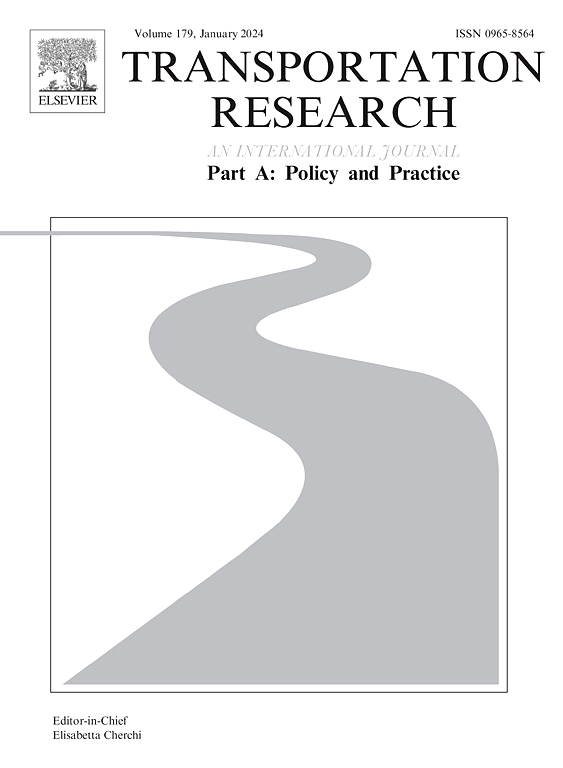出行时间可靠性、心理选择机制、可持续交通决策与智慧城市发展
IF 6.8
1区 工程技术
Q1 ECONOMICS
Transportation Research Part A-Policy and Practice
Pub Date : 2025-08-05
DOI:10.1016/j.tra.2025.104624
引用次数: 0
摘要
现有的土地利用-交通相互作用(LUTI)模型在很大程度上忽略了影响不确定性下出行决策的重要选择机制,如风险态度和模糊态度。在LUTI模型中,本研究将容纳两种行为要素的行为框架嵌入到空间一般均衡模型中。在改进的LUTI模型中,在交通系统存在固有的出行时间可变性的情况下,通勤者的选择行为影响了内生通勤成本,更重要的是,选择结果由他们的品味偏好和模糊/风险态度共同决定。然后,我们将模型系统应用于澳大利亚的一个城市,与忽略风险和模糊态度的传统模型相比,我们的基线结果与观察到的市场证据密切一致。这种一致性加强了我们行为逼真建模方法的有效性。此外,对改进的旅行时间可靠性的模拟揭示了通过促进可持续旅行和城市增长来实现智能发展的潜力。我们的研究结果强调了心理选择机制在加深对旅行行为动态和土地利用模式的理解方面的关键作用。基于研究证据,我们提出了具体案例建议和更广泛的政策影响。本文章由计算机程序翻译,如有差异,请以英文原文为准。
Travel time reliability, psychological choice mechanisms, sustainable transport decisions and smart urban development
Existing land use-transportation interaction (LUTI) models largely overlooked important choice mechanisms that shape travel decision making under uncertainty, such as risk attitude and ambiguity attitude. Within a LUTI model, this study embeds a behavioral framework which accommodates the two behavioral elements into a spatial general equilibrium model. In this improved LUTI model, endogenous commuting costs are influenced by commuters’ choice behaviors in the presence of travel time variability inherent in transport systems, and, more importantly, choice outcomes are jointly determined by their taste preferences and ambiguity/risk attitudes. We then apply the model system to an Australian city, where our baseline results, compared to a conventional model that omits risk and ambiguity attitudes, align closely with observed market evidence. This alignment reinforces the validity of our behaviorally realistic modeling approach. Furthermore, simulations of improved travel time reliability reveal the potential to smart development by promoting sustainable travel and urban growth. Our findings underscore the critical role of psychological choice mechanisms in deepening the understanding of travel behavior dynamics and land use patterns. Based on the study evidence, we offer both case-specific suggestions and broader policy implications.
求助全文
通过发布文献求助,成功后即可免费获取论文全文。
去求助
来源期刊
CiteScore
13.20
自引率
7.80%
发文量
257
审稿时长
9.8 months
期刊介绍:
Transportation Research: Part A contains papers of general interest in all passenger and freight transportation modes: policy analysis, formulation and evaluation; planning; interaction with the political, socioeconomic and physical environment; design, management and evaluation of transportation systems. Topics are approached from any discipline or perspective: economics, engineering, sociology, psychology, etc. Case studies, survey and expository papers are included, as are articles which contribute to unification of the field, or to an understanding of the comparative aspects of different systems. Papers which assess the scope for technological innovation within a social or political framework are also published. The journal is international, and places equal emphasis on the problems of industrialized and non-industrialized regions.
Part A''s aims and scope are complementary to Transportation Research Part B: Methodological, Part C: Emerging Technologies and Part D: Transport and Environment. Part E: Logistics and Transportation Review. Part F: Traffic Psychology and Behaviour. The complete set forms the most cohesive and comprehensive reference of current research in transportation science.

 求助内容:
求助内容: 应助结果提醒方式:
应助结果提醒方式:


